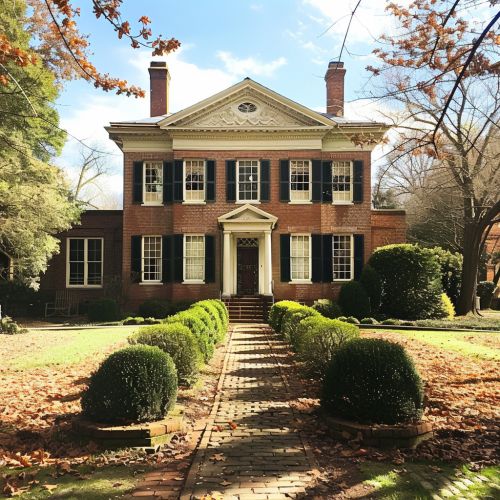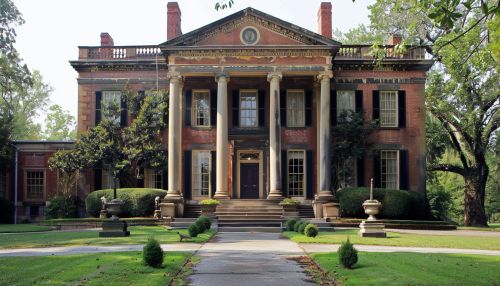John Marshall
Early Life and Education
John Marshall was born on September 24, 1755, in Germantown, Virginia, which is now part of Fauquier County. He was the eldest of fifteen children born to Thomas Marshall and Mary Randolph Keith. His father, Thomas, was a prominent figure in the Virginia militia and served as a surveyor, while his mother was related to the Randolph family, one of the most influential families in Virginia.
Marshall's early education was primarily conducted at home by his father, who instilled in him a love for history and literature. At the age of fourteen, he attended a school operated by Reverend Archibald Campbell, where he studied classical languages and literature. In 1775, Marshall enrolled at the College of William & Mary, but his studies were interrupted by the outbreak of the American Revolution.
Military Service
During the American Revolution, Marshall served in the Continental Army. He joined the Culpeper Minutemen in 1775 and later became a lieutenant in the Eleventh Virginia Regiment. He participated in several significant battles, including the Battle of Brandywine and the Battle of Monmouth. His military service provided him with a deep understanding of the challenges faced by the fledgling nation and fostered his commitment to the principles of republicanism.
Legal Career
After the war, Marshall returned to Virginia and began studying law under the guidance of George Wythe, a renowned legal scholar and one of the signers of the Declaration of Independence. He was admitted to the Virginia bar in 1780 and quickly established a successful legal practice in Richmond.
Marshall's legal career was marked by his involvement in several high-profile cases, including Ware v. Hylton, which dealt with the issue of debts owed to British creditors after the Revolution. His arguments in this case demonstrated his deep understanding of constitutional law and his ability to articulate complex legal principles.
Political Career
Marshall's political career began in the Virginia House of Delegates, where he served from 1782 to 1791. He was a strong advocate for the ratification of the Constitution and played a key role in the Virginia Ratifying Convention of 1788. His support for a strong federal government aligned him with the Federalist Party.
In 1797, President John Adams appointed Marshall as a diplomatic envoy to France, a mission that became known as the XYZ Affair. Marshall's conduct during this mission earned him national recognition and solidified his reputation as a staunch defender of American interests.
Chief Justice of the United States
In 1801, President Adams appointed Marshall as the Chief Justice of the United States, a position he would hold for 34 years. His tenure as Chief Justice is widely regarded as one of the most influential in American history, as he played a pivotal role in shaping the Supreme Court and establishing its authority.
Marbury v. Madison
One of Marshall's most significant contributions to American jurisprudence was his decision in Marbury v. Madison. This landmark case established the principle of judicial review, which allows the Supreme Court to declare laws unconstitutional. Marshall's opinion in this case asserted the judiciary's role as a co-equal branch of government and reinforced the system of checks and balances.
McCulloch v. Maryland
Another landmark case during Marshall's tenure was McCulloch v. Maryland. In this case, the Supreme Court upheld the constitutionality of the Second Bank of the United States and asserted the federal government's supremacy over state governments. Marshall's opinion emphasized the doctrine of implied powers and the necessity of a strong central government to ensure the nation's stability and prosperity.
Gibbons v. Ogden
In Gibbons v. Ogden, Marshall further expanded the federal government's authority by interpreting the Commerce Clause of the Constitution. The case involved a dispute over steamboat navigation rights, and Marshall's decision established that the federal government had the power to regulate interstate commerce. This ruling laid the groundwork for future federal regulation of economic activities.
Legacy
John Marshall's legacy as Chief Justice is characterized by his unwavering commitment to the principles of federalism and judicial independence. His decisions helped to define the balance of power between the federal government and the states, and his establishment of judicial review has had a lasting impact on the American legal system.
Marshall's influence extended beyond his judicial decisions. He was also a prolific writer and historian, authoring a five-volume biography of George Washington that remains a valuable historical resource. His writings reflect his deep understanding of American history and his dedication to preserving the nation's founding principles.
Personal Life
Marshall married Mary Willis Ambler in 1783, and the couple had ten children, six of whom survived to adulthood. Despite his demanding career, Marshall was known for his devotion to his family and his modest lifestyle. He enjoyed gardening, reading, and spending time with his grandchildren.


See Also
References
- Hobson, Charles F. "The Great Chief Justice: John Marshall and the Rule of Law." University Press of Kansas, 1996.
- Smith, Jean Edward. "John Marshall: Definer of a Nation." Henry Holt & Company, 1996.
- Newmyer, R. Kent. "John Marshall and the Heroic Age of the Supreme Court." Louisiana State University Press, 2001.
